- Home
- Research
- Find research
- GCM2019 - A rewarding first cancer conference
GCM2019 - A rewarding first cancer conference
On May 6th - 7th, we at Sahlgrenska Cancer Center had the pleasure of hosting the very first Gothenburg Cancer Meeting 2019! We were delighted to hear the invited speakers talk about their research and were excited to give the conference participants an opportunity to meet other local cancer researchers.
The purpose of this first Gothenburg Cancer Meeting was to create a venue for interaction between Gothenburg researchers. Hopefully this conference has opened up for many new opportunities and discussions.
A variety of presentations within the cancer field
The two conference days provided the visitors with a wide range of presentations. These varied from basic and translational research to clinical research. Illustrations of some of the speakers were graciously provided by Kerryn Elliott (see pdf document), postdoctoral researcher in Erik Lekholm’s group.
In the state-of-the-art sessions, professors of international recognition were presenting.
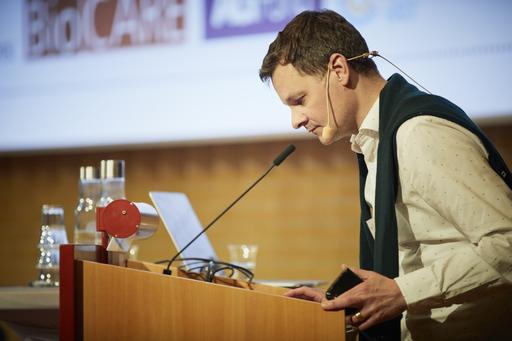
State-of-the-art topics
Kristoffer Hellstrand presented recent exciting data about predictive biomarkers from trials of Ceplene, a drug he has led the development of and is now approved for use in relapse prevention of AML. Additional data on Ceplene was also presented in other talks on the second conference day, by Fredrik Bergh Thorén and Anna Martner.
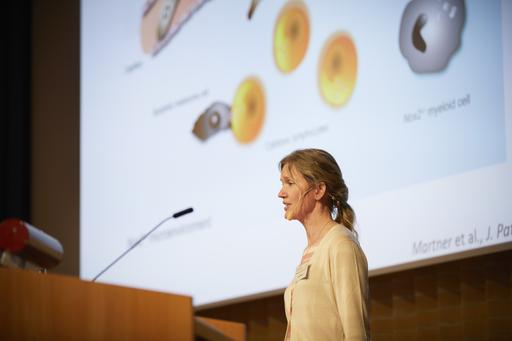
Following Hellstrand, Erik Lekholm showed evidence that sunlight (UV) induced DNA alterations (mutations) are more common in so called hot-spots and he provided mechanistic understanding of the process. Eva Haglind introduced surgical outcome data of new surgical techniques, such as robot-assisted surgery and laproscopic techniques. Surgeons love modern instruments, but if they improve outcome is only now becoming possible to assess.
The second state-of-the-art session featured Cancer researcher of the year 2018, Ruth Palmer, who demonstrated the use of many model organisms to understand cancer signaling, especially from a protein called ALK. Knowledge gained in the group, and that of Tommy Martinsson who presented on day two of the conference, has already helped patients - including children with neuroblastoma.
Chandrasekhar Kanduri presented data on neuroblastoma as well and delineated his research on long non-coding RNAs. These can regulate many processes in a cell and is frequently altered in cancer.
Chandrasekhar's talk was followed by the founding and former Director of Sahlgrenska Cancer Center, Göran Stenman, who presented how his team had identified a chromosomal translocation and then worked for many years to identify the genes affected by this translocation.
Interestingly, the deregulation of the MYB oncogene in this disease can be blocked by inhibitors against certain growth factor receptors, opening up hopes for patients with a poor prognosis disease called adenoid cystic carcinoma.
Antioxidant research in cancer
At the end of the first conference day, the audience got a chance to hear Martin Bergö in an extra talk about his research journey and the work on antioxidant stimulation of lung cancer metastasis.
Martin was also thanked for his contributions to Gothenburg cancer research. We are looking forward to follow his successful research as it is continued mostly at the Karolinska Institutet. His mechanistic discoveries of a critical transcription factor network, also presented in his talk, will be published soon in a distinguished journal.
A collaborator of Bergö, Volkan Sayin, has returned after a postdoc at NYU to start a group at SCC. On the second conference day, he presented additional insight into metabolism, antioxidants and lung cancer (unpublished and Sayin et al., 2017 Elife and Romero/Sayin et al., Nature Med 2017).
Immunology and Tumor biology
During both conference days, the participants could also enjoy many parallel sessions with excellent presentations. Amongst the speakers in the immunology session was for instance Lars Ny, who presented the PEMDAC epigenetic immunotherapy trial of uveal melanoma. Within this field Andreas Hallqvist also talked about the ASTEROID trial and Max Levin was showing how rare side-effects of immunotherapy can be tackled by using drugs used for other disease.
In the same session, colon cancer mouse model data were shown by Susanna Cardell, Sukanya Raghavan, and Marianne Qviding-Järbrink. This is of importance since this disease is not as responsive to current immunotherapy as compared to e.g. melanoma.
Parallel to the immunology session, the tumor biology and basic disease mechanisms session featured everything from biochemistry, cell biology and model systems.
Marc Pilon presented his innovative research on membrane fluidity, where key components have been genetically delineated using C elegans. Pernilla Wittung-Stafshede, instead demonstrated that a copper chaperone may have functions in cancer cells. Finally, Maria Falkenberg showed how replication of mitochondrial DNA occurs and how deletions in DNA may be found in human cancer.
Additional studies included talks from Mikael Nilsson on an animal model of thyroid cancer, and from Giovanni Solinas, who defined the role of PI3Kisoforms in insulin signaling. This is to gain mechanistic understanding of insulin action and to develop PI3K inhibitors with optimal therapeutic index for eg cancer (Molinari et al., 2019, Cell Metabolism, epub).
Radiotherapy and Disease-focused talks
The second conference day started with parallel sessions on radiotherapy and breast cancer as well as Pediatric and Hematological malignancies.
From Gunnar Steineck, we heard about radiation induced inflammation of patients and in a novel mouse model. From Per Albertsson and Eva Forssel-Aronsson, we learned about their studies moving radiotherapy of ovarian cancer and neuroendocrine cancers from mouse models to patients.
In the Breast cancer session we learned about novel patient-like models (Göran Landberg), precision medicine (Barbro Linderholm) and survival data, followed by radiation and surgery in breast cancer (Per Karlsson). The latter presented very recently published data on histopathological evaluations of patient samples from a trial, which has resulted in enhanced understanding of the role of both subtype as well as immunity in survival (Kovacs et al JCO 2019 and Sjöström et al JCO 2017).
David Bryder and Lill Mårtensson had presentations showing how mouse models can inform on mechanisms of development of hematological malignancies. In addition Martin Dalin and Helena Carén both showed how their clinical collaborations can generate diagnostic information using liquid biopsies as well as methylation arrays.
Patient oriented research
In two parallel sessions on Trials and Biomarkers, clinical researchers showed how they work with or run labs focusing on better treatment and diagnosis of patients.
Jan Lötvall demonstrated not only novel biological insight into exosomes, but also how these can be harnessed for use in therapy. Karin Sundfeldt then talked about her work, which focuses on exosomes as well as proteomics and genomics to diagnose or follow patients with gynecological cancers. Rebecka Arnsrud Godtman also presented data from the Göteborg trials (PI Jonas Hugosson) on PSA screening in prostate cancer.
Parallel to the biomarker presentations, in the Trials session, Caterina Finizia presented data on complications due to head and neck cancer treatment, and novel ways to improve patient’s quality of life. Cecilia Hveding-Blimark presented a survey over the impressive amount of novel treatments that has been developed for multiple myeloma and the trial data. She also ended by talking about a biobank under development.
The Trials session ended with Roger Olofsson Bagge presenting data on isolated limb and liver perfusion. Here, we were also able to follow in to the operating room to learn how perfusion is actually performed.
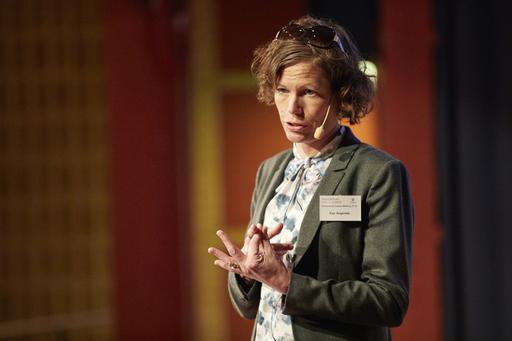
In the final conference session, with Cancerfonden Senior Investigators, Eva Angenete highlighted the importance of more soft values in cancer care, namely the expectations prior to cancer surgery.
Jonas Nilsson presented his research groups’ work with humanized mouse models and the SCC PDX Biobank, which has been opened up to inclusion of samples from clinicians treating melanoma, pancreatic cancer, colorectal cancer and many more. Anna Martner, the most recent receiver of the Cancerfonden Senior Investigator Award, then closed the final session with her research presentation about immune checkpoints in cancer.
Debate panel about future goals and challenges
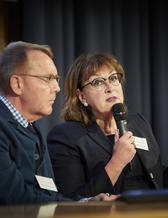
In order to look at future development and challenges for cancer research in Gothenburg and west Sweden, we arranged a panel debate as well. For this, we invited six different decision makers from environments where cancer researchers operate.
Amongst these panel members were Agneta Holmäng, Dean of Sahlgrenska Academy and the Director of Sahlgrenska University Hospital, Ann-Marie Wennberg-Larkö.
The other prominent GU and SU representatives in the panel were Claes Gustafsson, Chairman of research at Institute of Biomedicine, Johanna Svensson, Head of department of Oncology, Peter Naredi, Chairman of Institute of Clinical Sciences and Thomas Björk-Eriksson, Operations Manager at Regionalt Cancercentrum Väst.
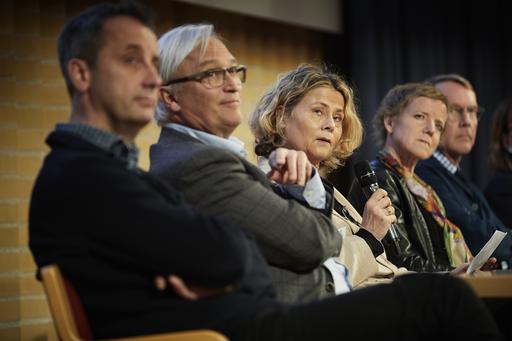
During the debate different questions were lifted, such as the importance of collaboration and in what forms this could best be constructed in the future. The best finance solution for centers and how buildings and facilities affect the research environment were other questions up for discussion.
In an article on Akademiliv you can read more about the Gothenburg Cancer Meeting 2019 panel debate.
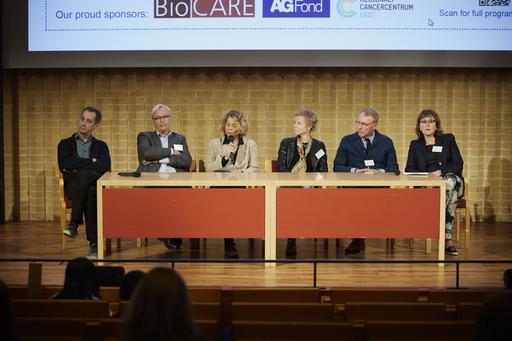
Great turnout shows great interest
With 280 registered participants, the interest in cancer research turns out to be great here in Gothenburg. This high interest in cancer research was also shown in the poster session, to which a total of 64 abstracts had been submitted. All of the posters were presented during an evening mingle on the first conference day.
Several awards were presented
At the end of the two very interesting conference days, we had the pleasure of presenting several awards within cancer research in Gothenburg.
Gothenburg Cancer Meeting Poster Award 2019
On the second day a Poster award was held, where we handed out diplomas for three Poster Award winners:
- Stefan Filges (not present during Poster Award) – “Ultrasensitive mutation detection in FFPE tissue and circulating tumor DNA of metastatic breast cancer patients”
- Elin Bernson – “Cytomegalovirus Serostatus Affects Autoreactive NK Cells and Outcomes of IL2-Based Immunotherapy in Acute Myeloid Leukemia”
- Hannah C. Sonnenberg – ”The role of Biniou and Bagpipe transcription factors in Alk signaling during Drosophila embryogenesis”
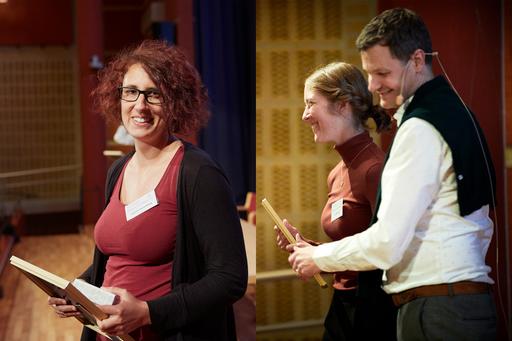
Assar Gabrielsson Award 2019
At the conference an Award Ceremony was also held for the 2019 Assar Gabrielsson Award, in which The Assar Gabrielsson Foundation presented the two winners of their yearly award.
Maria Frånlund, department of surgery at the Institute of Clinical Sciences, received the clinical cancer research award. The award in basic scientific cancer research instead went to Mikael Montelius at the department of Radiation Physics, Institute of Clinical Sciences. The two awardees both held a short presentation of their research.
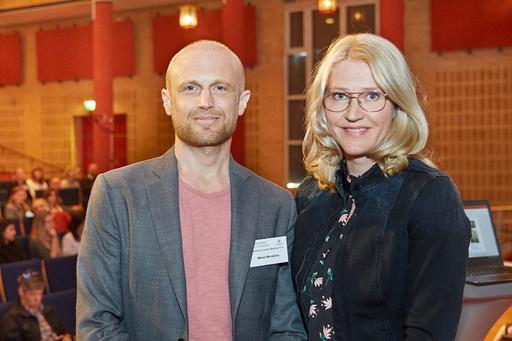
Text: Jonas Nilsson and Yael Zukovsky Fitoussi
All photos: Anna-Lena Lundqvist
Illustrations: Kerryn Elliott
(Illustrations from Kerryn can be found in the PDF)


